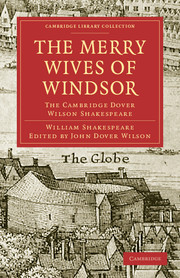THE COPY FOR THE TEXT OF 1623
Published online by Cambridge University Press: 07 September 2010
Summary
AND ITS RELATION TO THAT FOR THE BAD QUARTO, 1602
An editor of The Merry Wives has to reckon with two texts, both imperfect, though differing greatly in quality and authority: the Bad Quarto of 1602 and the Folio text of 1623. Bibliographically, the latter appears to belong to the same category as The Two Gentlemen; that is to say, it contains (a) no stage-directions of any kind, (b) no exits beyond the general ‘exit’ or ‘exeunt’ at the end of the scenes, and (c), with the single exception to be noted shortly, no entries except a list at the head of each scene of the characters appearing within it, in the order of their appearance. On grounds discussed at length in our edition of The Two Gentlemen (v. pp. 77–8), we account for these anomalies on the supposition that the ‘copy’ for the Folio text was made up by stringing together players' parts with the aid of the theatrical ‘plot’ of the play; and it is unnecessary to repeat those arguments here.
There is, however, one marked difference between these two plays which needs a word of comment. We found The Two Gentlemen singularly free from small textual ambiguities (though certainly not from wholesale corruption), and we offered a two-fold explanation of this: the simplicity of language in an early play, and the likelihood that verbal ambiguities would not be tolerated in players' parts.
- Type
- Chapter
- Information
- The Merry Wives of WindsorThe Cambridge Dover Wilson Shakespeare, pp. 93 - 102Publisher: Cambridge University PressPrint publication year: 2009First published in: 1921

